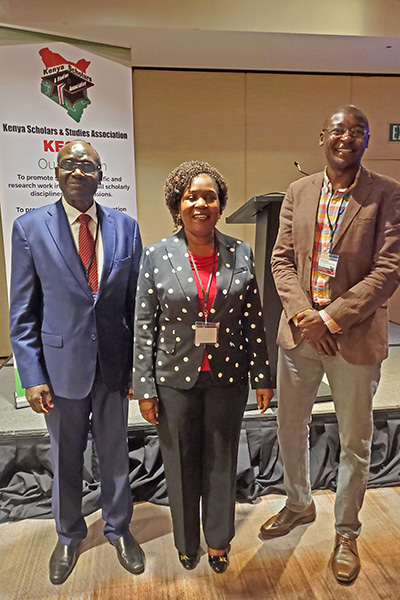- Apply
- Visit
- Request Info
- Give



Published on October 11, 2023

Steve Muchiri, professor of economics and finance, recently spoke at Kisii University in Kenya, presenting research and bringing attention to issues related to teenage pregnancy, intimate partner violence (IPV) and the impact of local communities on shaping young minds. His studies have shown the profound impact on subsidized female education in sub-Saharan Africa.
“The idea of using my research to create a positive impact in the communities it was intended for brings me great happiness and satisfaction,” Muchiri said. “It's a humbling experience to see how my work is improving the lives of the people I'm trying to assist. Witnessing the tangible impact firsthand is truly fulfilling.”
In the journal "Demography," his article titled "Impact of free/subsidized secondary school education on the likelihood of teenage motherhood" explores the obstacles that prevent children in poor Kenyan communities from receiving an education and how this can lead to fewer opportunities, especially for girls. It further examines how this lack of educational opportunities can result in teen pregnancies.
Several sub-Saharan African nations have recently adopted policies that offer subsidized secondary school education. This is significant because, unlike in the United States, parents are responsible for most of their children's education costs. In the article, he discusses these policies as a natural experiment to analyze the influence of free or subsidized education policies on the incidence of teenage pregnancy.
“The policy implementation resulted in a decrease of approximately five percentage points in the chances of teenage motherhood,” said Muchiri. “This is particularly significant because pregnant teens often drop out of school, but with a lower rate of teenage pregnancy, more girls can attain a good education. Furthermore, these policies generate beneficial externalities, such as long-term economic growth, poverty reduction and lower reliance on social welfare.”
Another article in the "Journal of Family Issues" titled “Out-of-wedlock adolescent motherhood and intimate partner violence in Kenya,” Muchiri delves into the issue of IPV among adolescent mothers in Kenya who have children out of wedlock. The study used propensity score matching techniques to analyze the prevalence and trends of IPV among these mothers and the likelihood of becoming a victim of IPV in their future marriages. The results show that adolescent mothers who have children out of wedlock have a 14% higher chance of being IPV victims in their future marriages compared with non-adolescent mothers.

“The paper notes that implementing policies and intervention plans in Kenya's cultural context is challenging,” Muchiri said. “Nonetheless, the paper proposes improving human capital among girls, creating laws to combat domestic violence and rape, and managing cultural practices that condone ‘wife-beating’ to address both IPV and out-of-wedlock adolescent motherhood.”
IPV is linked to negative birth outcomes, anxiety, depression and even suicidal thoughts, Muchiri noted. Children who witness IPV may become aggressive, have poor academic performance and are more likely to perpetrate IPV themselves in the future. Additionally, teenage motherhood is a significant issue for more than 16 million girls aged 15-19 becoming pregnant worldwide each year. Developing countries account for 80% of adolescent births globally, with sub-Saharan Africa having the highest incidence of teenage pregnancies.
“The strength of this platform was amplified by the fact that the university hosting the event is situated in an area with one of the highest rates of adolescent pregnancies,” Muchiri said. “Being a researcher, I found it to be a valuable opportunity to address these critical issues."
Teenage motherhood carries severe risks, including adverse health outcomes for both mother and child. Childbirth complications are the leading cause of death for 15-19-year-olds. Most teenage mothers drop out of school, leading to unfavorable outcomes such as unemployment, low earnings, and high welfare dependency. According to Muchiri, this leaves them unprepared for the emotional, psychological and financial responsibilities of parenthood and perpetuates unfavorable outcomes for generations to come.
Infants born to adolescent mothers also have poor outcomes, such as preterm delivery, low birth weight, higher mortality rates, and increased morbidity compared to those born to adult women.
“I found it challenging to keep my emotions in check during the speech,” said Muchiri. “There was a moment when I came close to shedding a tear while reflecting on the impact of teenage motherhood on different Kenyan communities. With my extensive travel in Kenya, I have seen firsthand the struggles faced by girls who are ill-equipped to handle life, have limited opportunities, and are often subjected to domestic violence.”
Written by Marcus Grant